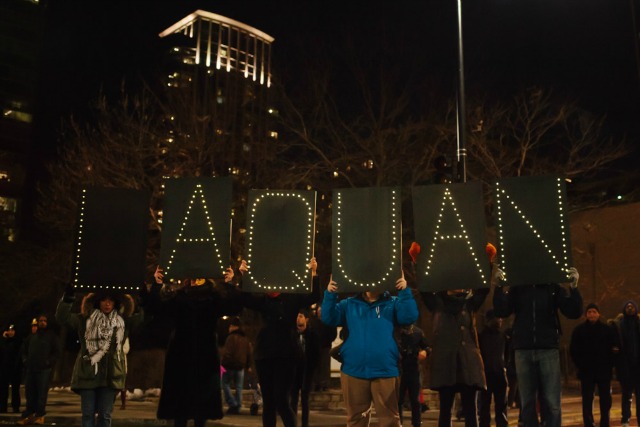Journalist Behind Laquan Video Says Rahm Is Using Him To Look Good
By Zoe Greenberg in News on Feb 26, 2016 4:00PM

Protesters march on Nov. 24/Chicagoist
This week Mayor Rahm Emanuel sought to appease critics of his Police Accountability Task Force, who say that the hand-selected committee lacks advocates for the public’s right to know, like journalists and first Amendment groups.
Emanuel defended the independence and credibility of the task force on Tuesday, saying they “actually did consult people that brought the lawsuit” related to Laquan McDonald. After that consultation, the task force published its first police accountability policy, which requires the police department to release video and audio from police shootings and other incidents within 60 days. (Emanuel was not eager to speak about the task force and the public's right to know, but Mark Konkol tracked him down outside the 47th Street Red Line Stop.)
Emanuel sought to reassure people by claiming the task force consulted those who had criticized police behavior in the past. But Brandon Smith, the freelance journalist who brought the lawsuit that led to the release of the McDonald video, told The Chicagoist that he would not exactly characterize his conversation with the task force as a "consultation."
Smith said attorneys Sergio Acosta and Lori Lightfoot contacted him and his lawyer, Matt Topic, by phone, 36 hours before they announced the new recommendations to the public.
“To me, they really came across as talking to us as a final notion, almost an attempt to get our blessing,” Smith said.
Smith, who took notes during the meeting, said Acosta asked if he and his lawyer would still consider suing the city through the Freedom of Information Act, or FOIA, if the city promised to release video footage within 60 days. FOIA is the state law that requires the city to release video footage within 5 days, or cite the specific exception that allows the records to be kept secret.
“We told them we probably will not sue the day after your deadline is up with FOIA,” Smith said. “But it doesn’t make sense to take four times as long as the FOIA deadline, because FOIA is the actual law.”
The Police Accountability Task Force, which was created in December in response to citywide outrage over the chilling Laquan McDonald shooting video and subsequent cover-up, was supposed to “strengthen the fabric of trust” between police and the public.
But it is not a legal body, and its policy recommendations, like the 60-day window on releasing police records, are not legally binding. In fact, Attorney General Lisa Madigan, the top law enforcement officer in Illinois, told Konkol that the Task Force policies don’t actually make much difference.
"It doesn’t overrule the current law. That law is FOIA, and it should be followed," she said. "FOIA is one of the reasons that we actually got to see the Laquan McDonald video.”
Smith said sixty days could be too long to wait for video footage of police violence, especially if an officer who killed a civilian is still on the street.
“The public interest is not necessarily served by waiting sixty days,” Smith said. “In certain cases, we think the public is served better by a quicker timeline.” As for the idea that Smith was consulted by Emanuel’s team, he phrases it differently.
“The word ‘consulted’ is very broad. It makes it sound like I was part of the process of developing it. Which is untrue. They asked me what my opinion was. I told them their idea was not good for transparency. If that means that I was consulted, then sure, but don't just stop there,” Smith said.
Protesters shut down the task force's final of four public meetings in Rogers Park Thursday night.